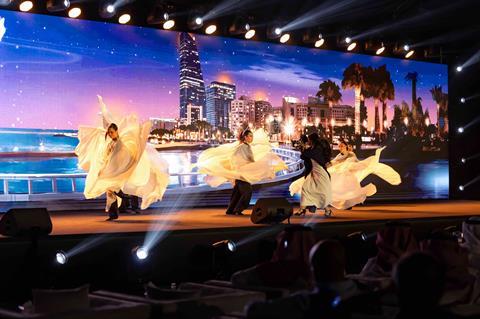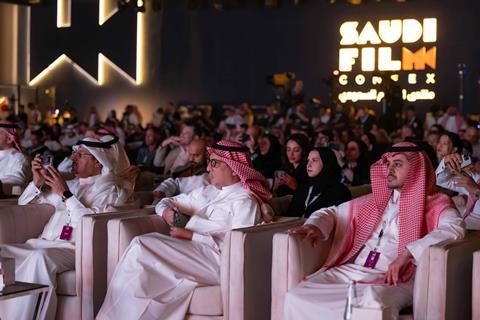The third edition of Saudi Film Confex, organised by the Saudi Film Commission (SFC), attracted some 80,000 visitors over the five-day film busine
The third edition of Saudi Film Confex, organised by the Saudi Film Commission (SFC), attracted some 80,000 visitors over the five-day film business event in Riyadh, which ran from October 21-25.
The exhibition, conference and masterclass series brought together executives from the Saudi industry as well as a number of international guests and speakers, including US execs Stuart Ford, Alex Walton and Tom McGrath. According to the organisers, the event had over 130 booths, 35 participating countries, 30 workshops and 20 panel discussions.
Reflecting the dynamics and timings of the Saudi industry, Confex kicked off each day at around 15.00 and was busiest in the early evening from about 20.00 until at least 23.00.
The event took place against a backdrop of an expanding Saudi industry, which is steadily growing as part of the government’s 2030 vision to diversify the country’s economy. According to recent SFC figures, the national incentive programme supported 64 projects in 2024, generating $288m (SAR288m) in local expenditure.
Infrastructure developments such as JAX Studios, AlUla Studios and Neom Media Village have also expanded production capacity, while university programmes, workshops and training labs have been a focus for developing Saudi talent. The SFC said the number of Saudi production companies reached 65 in 2024, while events such as the Red Sea International Film Festival, the Saudi Film Festival and Confex have increased engagement with the industry.
Screen reports on seven talking points from Saudi Film Confex 2025:
Star guests
The Saudi industry likes to wow event attendees with a starry guest speaker, and Confex was no different. Johnny Depp attended on the opening day, talking about his acting craft. Depp has become a familiar figure at events within Saudi Arabia in recent years. The Red Sea Film Foundation backed Depp’s recent directorial effort, Modi, the biopic about the life of Italian artist Amedeo Modigliani, which played at the San Sebastian Film Festival last year. The Red Sea Film Festival earlier provided post-production financing for period drama Jeanne Du Barry, which starred Depp and opened the Cannes Film Festival in 2023.
Local focus
Many international speakers at Confex advised the Saudi industry to focus on growing its local film industry, concentrating on developing and producing films for Saudi audiences, rather than necessarily focusing on attracting international productions. Former Paramount Pictures president Tom McGrath said international productions would come in time. “But to really build the market, it’s about focusing on what is special and unique about the culture and the people and the land here.”
Muvi Cinemas CEO Adon Quinn noted Saudi films so far this year account for an impressive 23% of box office in the country, up from 8% last year. “The growth of this industry is going to be local,” said Quinn. “The biggest thing that we can do for the overall industry – and what will help with the expansion of the box office and the cinema industry in Saudi – is supporting local content.”
Saudi hits this year include comedy Shabab Al-Bomb 2, the highest-grossing local film to date.
Artificial intelligence
As at many conferences this year, AI was a major topic. At Confex, a key focus was on how Arabic-speaking countries such as Saudi Arabia can effectively harness the AI revolution, much of which is being driven by English-speaking tech companies based on the west coast of the US. As a result, Saudi Arabia is investing in its own AI champion, Humain, which was launched in May by Crown Prince Mohammed bin Salman to develop advanced Arabic-language models, as well as data centres and AI infrastructure. Humain’s chief strategy officer Steve Plimsoll attended Confex, stressing the biggest priority for the company is to become a culturally relevant as well as a historically and religiously exact AI tool for Saudi Arabia, the Middle East region and Arabic speakers worldwide.
Growing confidence
There was a distinct whiff of confidence about the Saudi industry at Confex. Given the fledgling nature of an industry that only really started embracing cinema in 2018, many speakers cited a number of achievements over the past year.
Venice premiere Hijra was recently selected as the country’s entry to the international Oscar category, while the Red Sea Film Foundation backed four films playing at Cannes this year.
The second biggest film at the Saudi box office this year is local hit Shabab Al-Bomb 2, just behind Lilo & Stitch.
“The wonderful flashes of creativity starting to come out from Saudi are probably your most compelling calling card for future partnerships,” said former BFI chief executive Amanda Nevill, who is on the board of the Saudi Film Commission and a non-exec advisor to Olsberg SPI.
“Creative people love to mix with other creative people.”
McGrath emphasised the need for Saudi filmmakers to secure distribution for their films not just in the Saudi market, but also in other Arab-speaking markets and internationally. “It is as important that the entire region sees the work as it is to figure out how to get it entered at the Cannes Film Festival,” he said.
Sticking at it
Many international speakers advised the Saudi industry and the country’s government to keep focused on the long term. They also compared Saudi Arabia to countries that have rapidly grown their film industries in a relatively brief space of time, such as China, South Korea and Turkey. “This is a 20-25 year horizon we should be looking at,” said Nevill. She noted there is a common theme linking countries that have successfully built their film industries in a brief period of time: “It is because they have huge government support and a clear direction.”
Financing challenges
Among the challenges facing the industry is how to align the respective interests of the film industry and the banking sector. Accessing film finance from established banks has often proved a challenge, both for local and international filmmakers looking to film in the country. Film financing “doesn’t really fall into the typical corporate financing structure” that Saudi banks are used to, acknowledged Faisal Darwish, head of Institutional banking at leading Saudi bank Banque Saudi Fransi (BSF). “It is not easy. It is difficult. We have to think differently. We have to be a bit more creative…The more we get exposed to it, the more we understand this business.”
Tom McGrath noted the headline rate of the Saudi film incentive, which offers a 40% rebate to filmmakers, is internationally competitive. “But there might be some more streamlining of the process and the paperwork,” he said. The incentive’s benefits also need to be more widely communicated to international producers, he said, so the country attracts more co-productions.
Industry microcosm
Confex, in many ways, was a microcosm of the growing Saudi industry. The exhibition hall was comfortable, beautifully designed and straightforward to navigate. There were some truly impressive stands from the likes of the Saudi Film Commission and AlUla, as well as the latest in filming kit on display. For visitors wanting to learn about incentives through to filming locations, production service companies, local studios or kit suppliers, Confex was very useful.
There was an intriguing mix of Saudi and international speakers at the conference. It was a very hospitable event too; the Saudis are famously welcoming and warm to visitors, and Confex fully lived up to this reputation. There were always staff on hand to facilitate and advise, and to dispense established Saudi coffee and dates. For a relatively newborn event, there were teething organisational problems to iron out in future editions. For example, the speaker schedule for the conference was only released on the first day of the conference – making planning for visitors arduous and also resulting in relatively destitute attendance for some panels. But these can be resolved in years to come.


COMMENTS